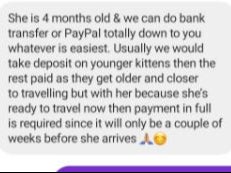The craze for hairless “bully” cat kittens is leading unlicensed breeders to illegally use Instagram and Facebook to sell the animals for thousands of pounds each, an investigation has uncovered.
“Bully” cats, which have soared in popularity on social media, are born to suffer, according to critics. Bred to be short-legged and hairless, the animals are at high risk of health problems and die younger than other cats, welfare experts say.
But a network of breeders and “middlemen” are cashing in on the fashion for the pets with wrinkly skin, selling each for as much as £6,000 – so a litter of six would fetch their owner £36,000.
The Independent has seen numerous posts on Instagram and Facebook by users advertising newborns or young kittens, asking would-be buyers to privately message them.

Under “Lucy’s Law”, introduced five years ago, only licensed breeders may sell pets under six months old. Anyone selling puppies or kittens without a licence could receive an unlimited fine or be jailed for up to six months.
Licensed breeders would typically provide their full name, registered premises and licence number.
But some sellers are offering kittens imported from abroad as young as four months. The Independent has seen an exchange of messages in which one breeder offered to send a white hairless kitten to the UK from Russia for £6,000.
Several Facebook groups dedicated to “bully” cats have thousands of devoted members, often asking where they can get one.

As well as being illegal in the UK, the trade is in breach of the policies of Meta, which owns Facebook and Instagram.
The breed was created by crossing hairless sphynx cats with munchkin cats, which have short legs. They are called “bully” cats because of a supposed resemblance to bully dogs, bred to look aggressive with a solid build and wide body.
The RSPCA says the animals’ short legs may strain their joints, causing pain and limiting their mobility – and “excessive” skin folds leave them vulnerable to skin infections. The cats have no whiskers with which to explore their environment, as other cats do.
The lack of fur can lead to sunburn and skin cancer, and vets say they are likely to suffer shortened lives.
Health problems can cause the animals great discomfort and leave owners with frequent, high vet bills.

A coalition including the British Small Animal Veterinary Association, Battersea, Cats Protection, the People’s Dispensary for Sick Animals, International Cat Care and the RSPCA has branded breeding for extreme characteristics unethical and urged owners to stop breeding them.
As well as the risk to the kittens’ health, buyers are risking large sums of money because “the sales come with no guarantees and the process is opaque”, according to one investigator.
“Middlemen” buy pets to sell for a profit, usually in a different location from where the animals were born, so the animals are untraceable.
The investigator who spotted “bully” cat kittens advertised on Instagram posed as a customer. In private messages, the seller said the 10-week-old kittens would cost £5,000 each.

“We arranged to visit to see the kittens and their mum before choosing one,” the investigator said. “The address was a semi-detached property, clean and well kept, in what seemed a decent neighbourhood. We later found out it wasn’t the cats’ home – they were brought in specifically for the sales visit. So we had no idea where the kittens were actually from or whose house we had been to.”
The seller was friendly but not very forthcoming about herself or the cats, he said.
“She gave only her first name and was vague about the kittens’ parents. She said she hadn’t had the mother long and ‘got her shipped over from abroad’.
“The seller claimed the mother was ‘registered’ and this was her second litter, but didn’t know any more detail. She stated the father was ‘just a stud’ and didn’t provide any information about him.”
A reputable breeder would usually be keen to demonstrate a pedigree kitten’s lineage, and this seller admitted being a “hobby breeder” – without a licence.

She wanted a cash deposit of £1,000, becoming “very impatient” to confirm a sale, arguing she had initially wanted £6,000 for each but saying she had dropped the price.
Four other kittens from the litter had sold already.
The investigator said the seller wanted to know “whether she could take the kittens back to their home if we weren’t going to buy that day” – proving she was selling illegally as a third party.
Pedigree paperwork for the kittens revealed the owner was not the seller.
“It became clear this was not a reputable breeder, but someone selling untraceable and potentially unhealthy kittens via social media.”

Another seller offered to help the investigator to find a partner to continue breeding “bully” cats.
Cats Protection is campaigning for a ban on “bully” cats and others bred with extreme traits, such as the Scottish Fold.
Alison Richards, of the charity, said: “We’re incredibly concerned about the breeding of cats with extreme body types and have seen some sellers advertising ‘bully’ cats on online selling sites.
“Our veterinary assessments of the photos and videos we have seen of these cats have raised serious welfare concerns.”
Animal welfare charities repeatedly urge would-be pet owners to adopt a rescue cat instead of buying from a breeder.

Last year analysis of hundreds of Facebook and Instagram posts found rogue puppy dealers were widely using the platforms to sell underage pets bred in cruel conditions and dogs with exaggerated features.
Sellers evaded the social media giants’ guidelines by using code words, emojis and hashtags with secret meanings, a report found.
Last February, breeding or owning an XL bully dog in England and Wales without an exemption was outlawed, but there is no specific legislation on breeding “bully” cats.
The Naturewatch Foundation has warned against the “disturbing” trend to show off “bully” cats on Instagram and TikTok.
The Independent has asked Meta to comment.














